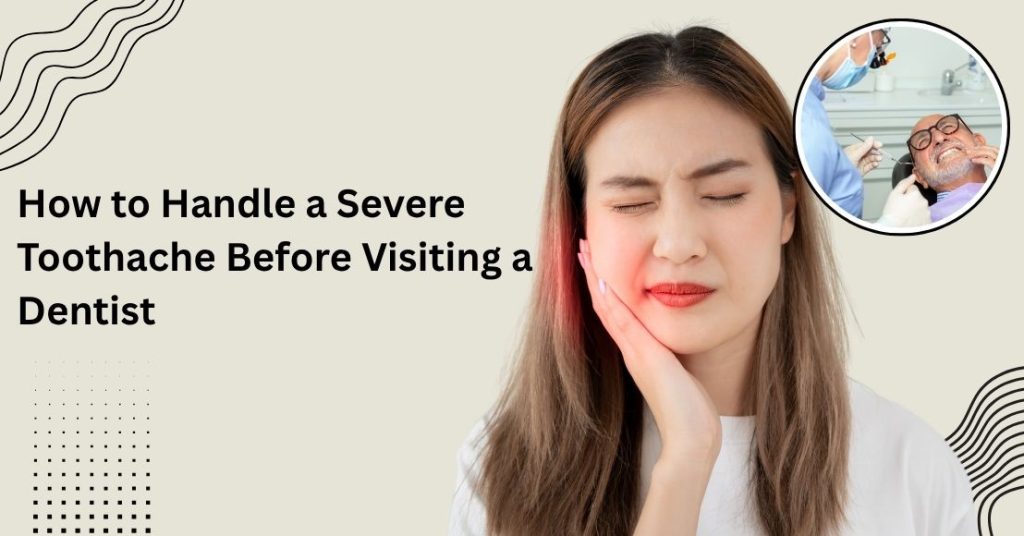How to Handle a Severe Toothache Before Visiting a Dentist

A sudden, intense toothache is more than painful. It could disrupt your work, sleep, and everyday life. Although a visit to the dentist is vital to address the root of the issue There are effective methods to treat the discomfort and prevent issues prior to the appointment. In this article we’ll look at the practical ways, home remedies as well as professional advice on how to handle the pain of a tooth efficiently. Understanding the Causes of Severe Toothache The cause of toothache could be different dental problems, such as: Understanding the potential causes helps in determining the best techniques for pain management until medical treatment is offered. 1. Cleanse Your Mouth with Warm Salt Water One of the easiest and most effective treatments is using warm salt water for rinses. What can it do to help: Method Procedure: Dissolve half one teaspoon of salt in the warm water in a glass and swirl the salt in your mouth for between 30 and 60 minutes. Repeat several times throughout the throughout the day if you feel it is necessary. 2. Use Over-the-Counter Pain Relievers Carefully OTC painkillers like acetaminophen and ibuprofen are able to aid in reducing toothache discomfort temporarily. Tips to ensure safe use These drugs are not an answer but they do help to manage discomfort until you go to the dentist. 3. Apply a Cold Compress A cold compress can help reduce swelling and help numb the region for temporary relief. Applying for a job: This is especially helpful in cases where the toothache is due swelling or trauma. 4. Avoid Trigger Foods and Drinks Certain beverages and foods can aggravate tooth pain, for example: Instead, limit yourself to soft food and lukewarm drinks until you have a dental appointment. This will help prevent further discomfort or damage to the tooth affected. 5. Keep Your Head Elevated While Resting If you lie down, blood may pool in the skull which can increase pressure and aggravate tooth pain. TIP: Use a second pillow to ensure your head is elevated when you sleep or relax. This can help to reduce discomfort and throbbing in the evening. 6. Maintain Oral Hygiene Gently Even when your tooth hurts keeping your mouth clean is vital to stop the spread of infection Clean teeth lower the burden of bacterial and reduce the chance of developing further complications. 7. Use Clove Oil for Natural Relief Clove oil contains natural antibacterial and analgesic properties and is a well-known solution for toothaches. How to utilize: Take care not to consume clove oil or swallow it, and do not use it for too long, since it may cause irritation to the oral tissues. 8. Avoid Self-Medication Beyond Basics While home remedies may provide some temporary relief, do not self-medicate using strong painkillers or antibiotics that are not prescribed. Unintentional use may mask symptoms, increase the condition, or trigger side consequences. A dentist can determine the root of the issue and recommend the appropriate treatment, whether that’s the filling of a tooth, a root canal or any other procedure. When to Seek Emergency Dental Care Certain toothaches are indicative of serious problems which require immediate attention for example: If you notice any of these signs, don’t wait until an annual dental appointment. Go to the emergency dental clinic or visit the hospital right away. Also read – Why Regular Dental Checkups Keep Your Teeth Healthy Conclusion A severe toothache isn’t something to avoid. Although home remedies such as hot saltwater rinses cold compresses OTC painkillers and clove oil could offer temporary relief but they are not a substitute for the need for professional dental treatment. The best way to avoid permanent damage is to make appointments for a dental visit quickly and avoid activities that can aggravate the problem. If you combine careful home care along with prompt professional attention it is possible to minimize the pain and ensure your oral health efficiently. FAQs 1. Do I have to overlook a toothache that is gone for a few minutes? Even a brief relief does not mean that the issue is solved; the root causes could become worse if not treated. 2. Can you safely apply clove oil to toothache? Yes, but in small amounts applied externally, but beware of taking it in large doses and using for long periods of time. 3. What is the best time to see an urgent dentist? Get medical attention immediately if you are suffering from severe swelling and fever, or trouble breathing or swallowing. 4. Can OTC painkillers relieve toothaches? They are only temporary relief from pain until the underlying problem is resolved. 5. What can you do at home to be used to prevent further toothaches? Keep your teeth clean and flossing regularly and limit the consumption of sugary foods and make sure you visit your dentist regularly to examinations.
